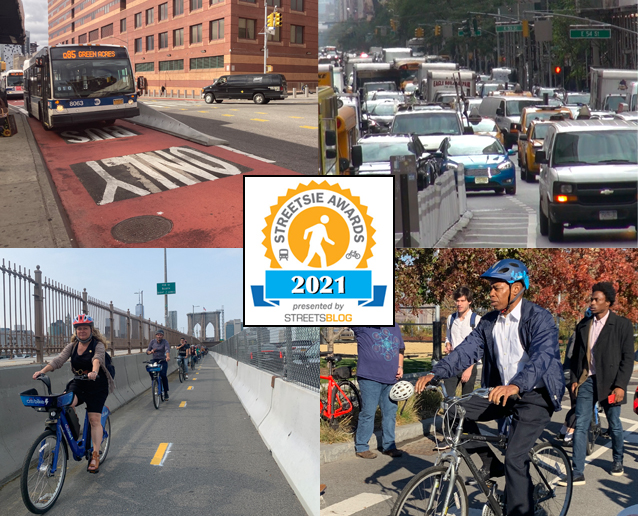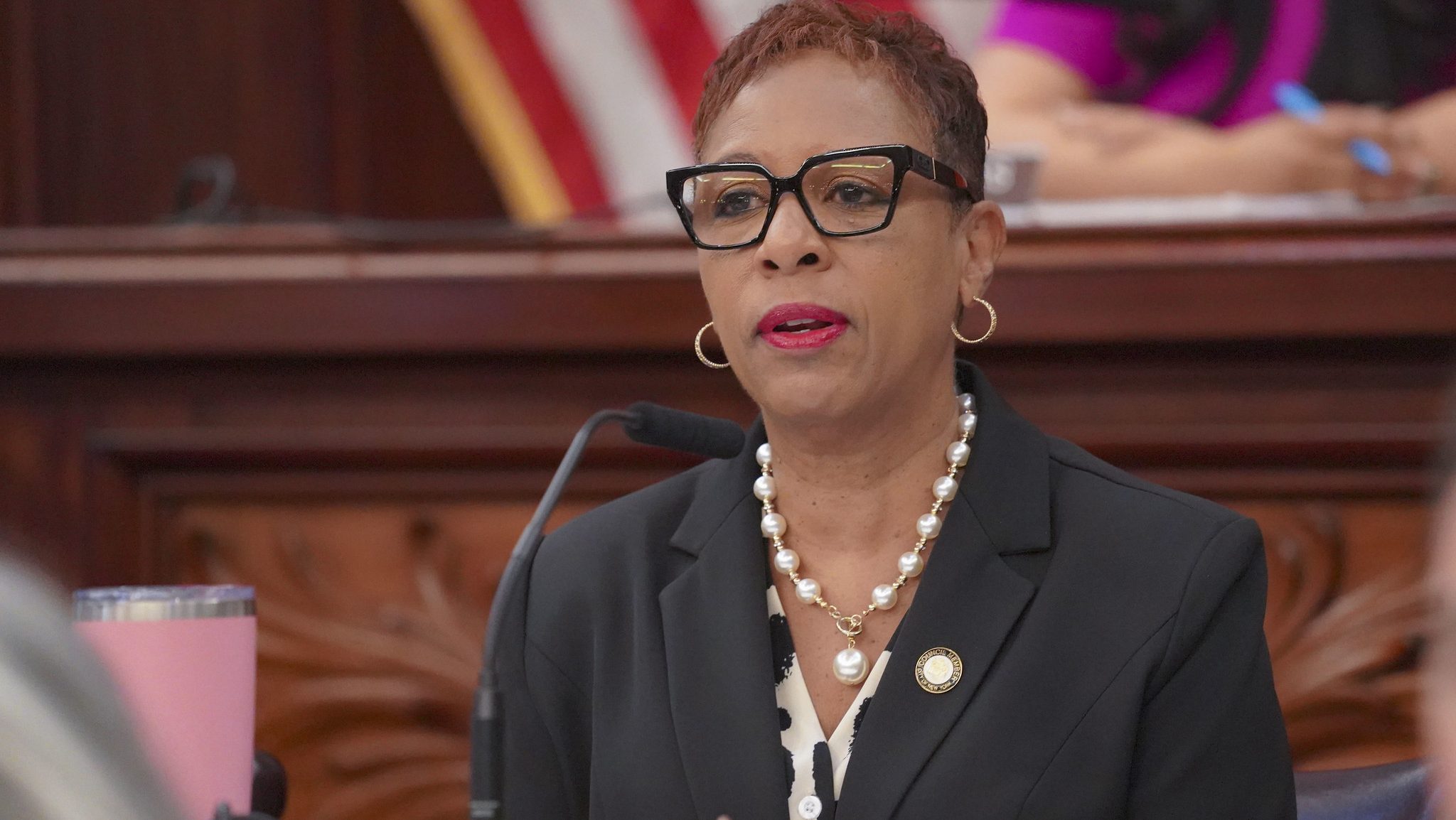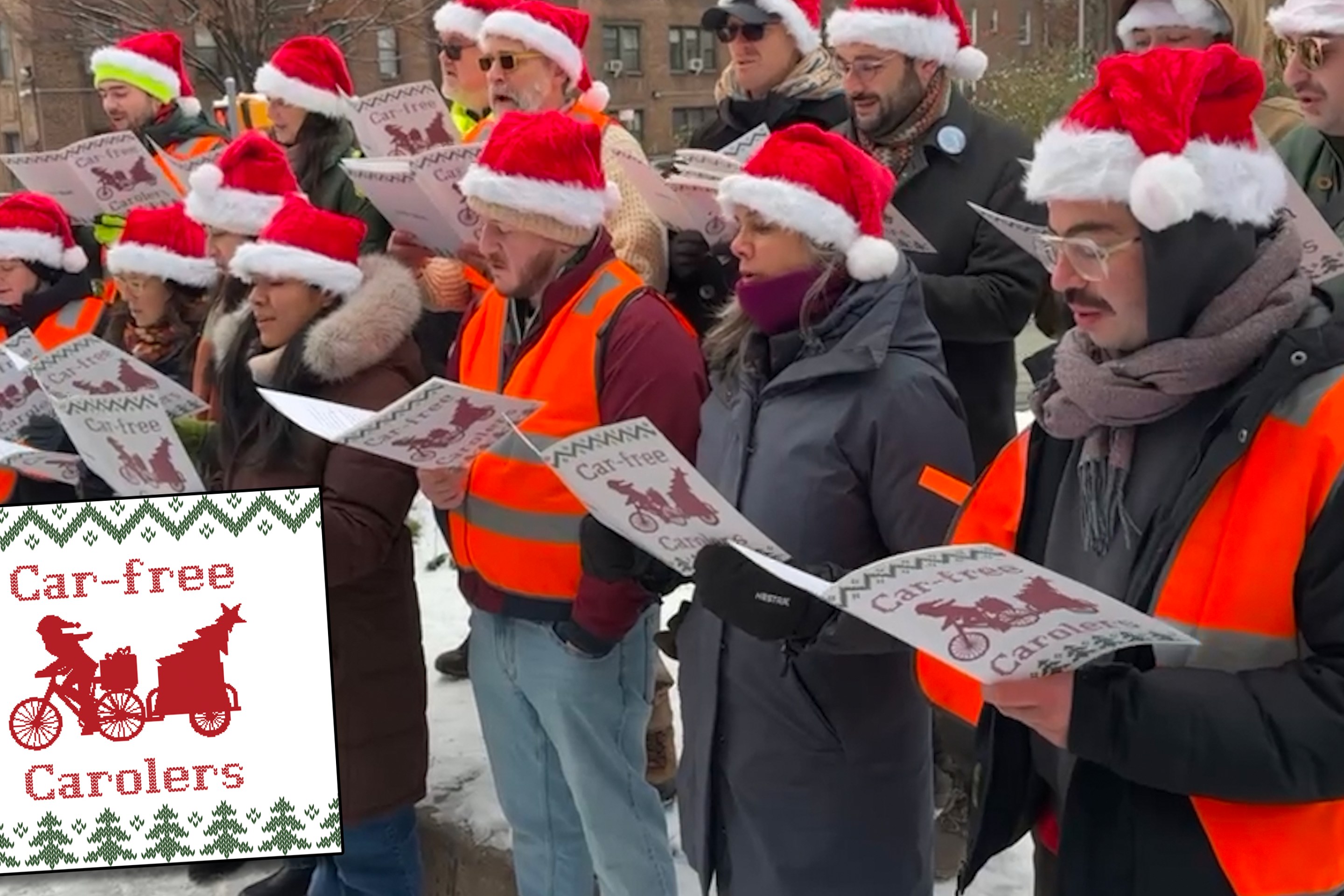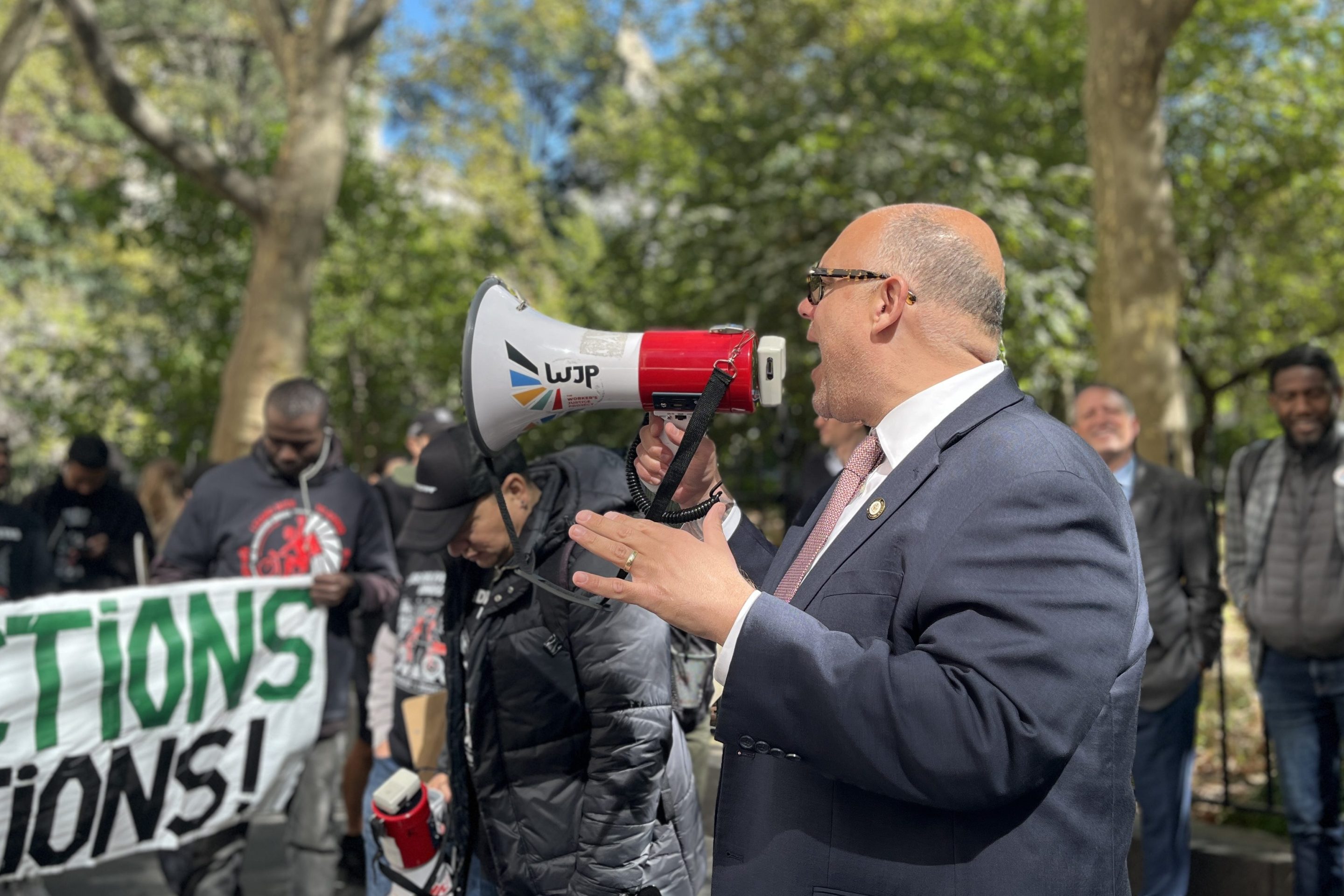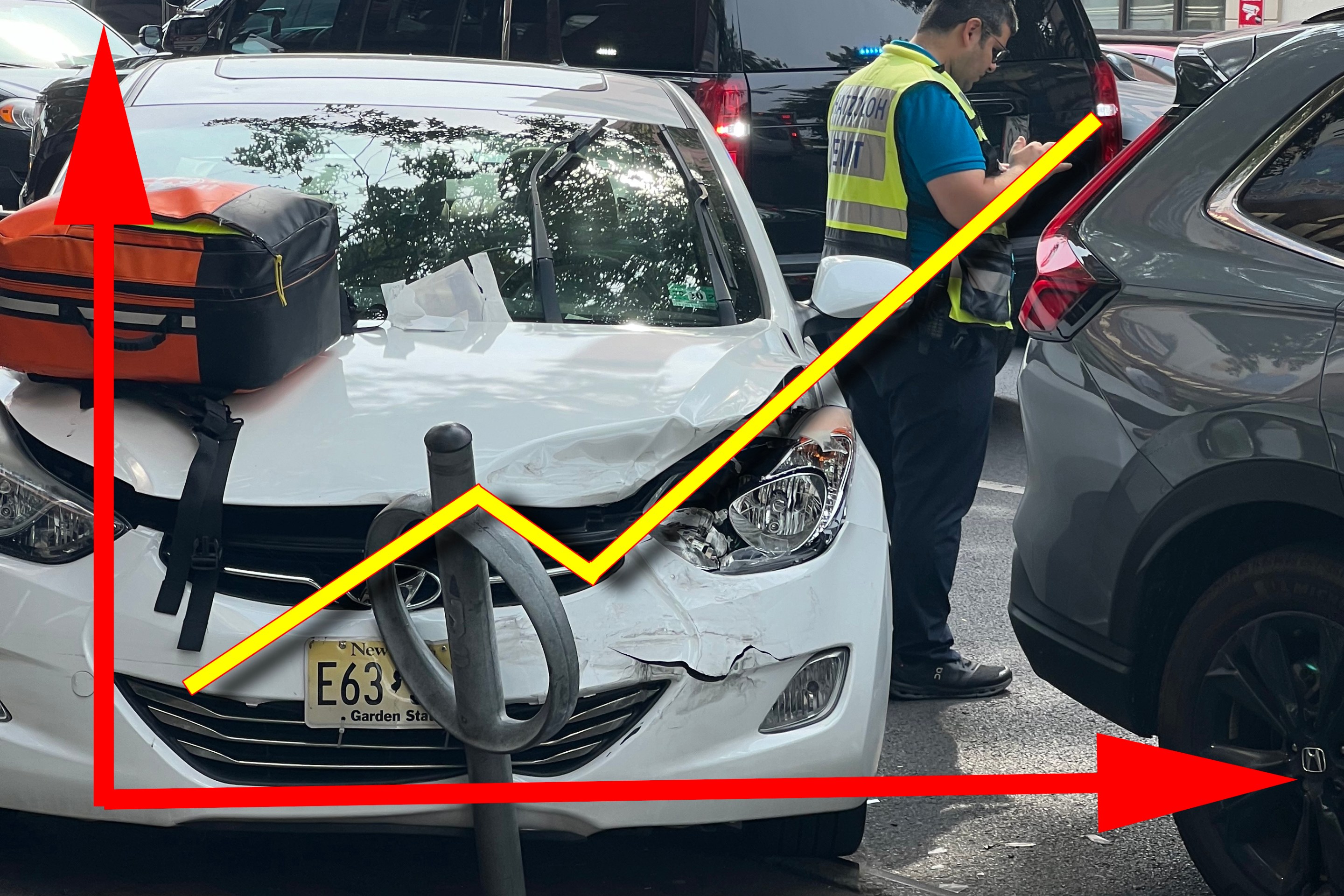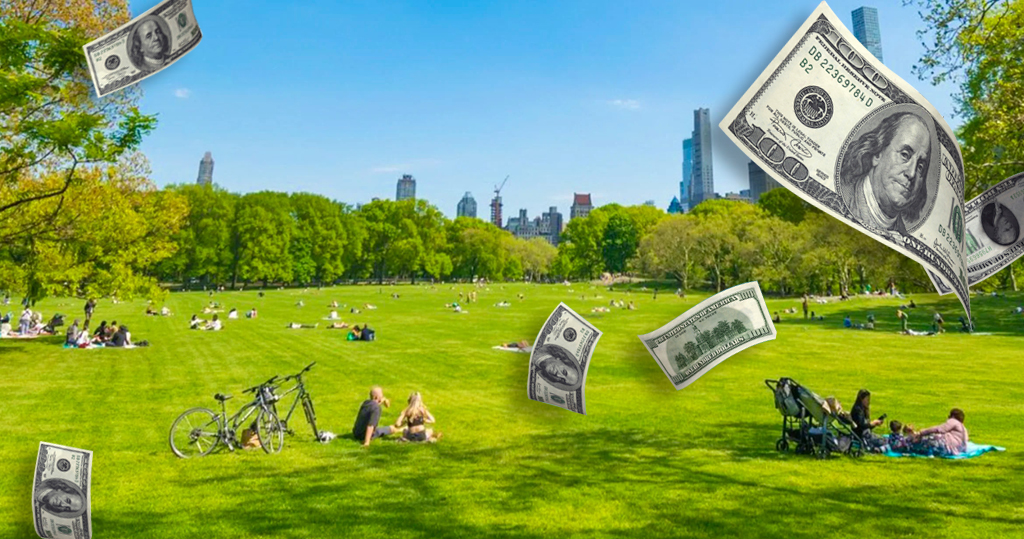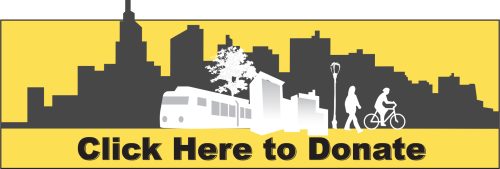
All this week, we're rolling out our year-end awards, the coveted Streetsies. Yesterday, we looked at the best projects of the year (and you can vote to break the tie through Thursday). All our 2021 Streetsie Awards are archived here.
There are, as always, plenty of reasons to be pessimistic about the future of transportation in New York City. An ongoing carpocalypse that everyone warned the mayor about, the MTA's continuing teeter on the brink of financial disaster, community boards still blocking street safety measures, and Major League Baseball owners instituting a lockout days after the Mets signed Max Scherzer. But it's not all bad — and here are reminders that suggest that maybe, just maybe, 2022 will provide some transformative change.
Gov. Hochul pulling the brake on the Airtrain
Even after all this time, no one knows exactly why then-Gov. Cuomo pushed so hard for so long for his beloved wrong way air train to LaGuardia Airport (though the state's corrupt contractor-industrial complex is a leading candidate). The idea of a monorail that only got you to Manhattan by first taking you to lovely Citi Field was clearly not the best thing we could get for $2 billion. Fortunately, after Cuomo left office amid multiple reports of sexual harassment, Gov. Hochul asked the Port Authority to "thoroughly examine alternative mass transit solutions" for creating a link to the airport, likely dooming the "wrong way" AirTrain.
Then in November, the PA convened an "expert panel" of transit thinkers to guide the search for those alternatives including MTA officials and former city Department of Transportation Commissioner Janette Sadik-Khan. Is there a guarantee that the panel will come up with any of the workable ideas that have been suggested in the past, like a busway or an N train extension? We are not prophets, but surely a more rational end game exists now without the monomaniacal devotion to the monorail coming out of New York State's executive mansion.
The rise of the deliveristas
As Joe Hill sang 108 years ago, there is power in a union. New York City was first introduced to the organizing power of the city's e-bike delivery workers in the back half of 2020, when Los Deliveristas Unidos took to the streets to make themselves known.
In 2021, the group flexed its muscle, winning two legislative victories and kept the spotlight on the unsafe working conditions faced by delivery app riders. In the New York State Legislature, LDU and app-based drivers sank a last-minute package of bills proposed in May that would have traded bargaining rights for an inability for local cities to pass their own laws regulating the app/worker relationship. Junking that proposal ensured that the City Council's LDU-endorsed bill package governing trip lengths and minimum pay rates for deliveries would still have teeth when it passed in September.
LDU is also tackling the safety issues delivery riders face on the job, confronting the NYPD's shortcomings when the department allows key bike routes to become dangerous robbery points or when the NYPD's dangerous driving kills delivery cyclists. And the union had a key role in getting the NYPD to shift its enforcement strategy away from victims and onto those who victimize delivery workers.
If the e-bike revolution is the future, the workers who rely on the bikes are going to need representation and support they can depend on. Los Deliveristas Unidos's inside-outside game, organizing immigrant workers and getting their concerns heard by the city's next class of elected officials, is an exciting new dimension to safe streets activism in New York City. LDU is also going to be more necessary than ever in the face of business ideas like 15-minute grocery delivery that rely on worker exploitation and unsafe cycling practices, a toxic stew that could drive another anti-e-bike backlash.
A bikelash-free election and a biking mayor
Elections can sometimes turn into backlash referendums on things that segments of the voting population stew over for years on end. Mayor de Blasio was not the perfect Vision Zero vessel, but his administration did install many miles of protected bike lanes and removed plenty of parking over the course of his eight years in office, leaving room for an opportunistic Democratic candidate to pitch him or herself as opposing further street safety improvements in an effort to succeed the mayor. (Think Anthony Weiner running for mayor in 2013 saying he would rip out Bloomberg's bike lanes.)
That didn't happen though. Instead, Democratic candidates showed up at bike- and transit-focused forums and campaigned in support of open streets. Some of them went after the Streetsblog vote by submitting their transportation plans to reader scrutiny, some of them even took bike rides with Streetsblog. By the time the general election came around, Republican nominee Curtis Sliwa's vow to rip up bike lanes and remove speed- and red-light cameras was a one-day story, drawing less heat than the moment the GOP candidate was hit by a taxi after his own ludicrously unsafe dash into moving traffic.
In addition, the incoming mayor is a cyclist who invited the press to join him on a ride after his primary win. The fact that Eric Adams sometimes gets on a bike won't guarantee that he'll be the true bike mayor that SUV-driven de Blasio could never be, but surely we can hope that a mayor who understands what it's like to bike on Atlantic Avenue might show some interest in redesigning it.
A breakthrough on bike parking
Speaking of the mayor who rides a bike, Adams also embraced the challenge of solving a problem that the city has let fester for years now: the need for secure bike parking on the scale to match the bike boom. It's not clear if Mayor Adams, who talked a lot during the campaign about shaking up the city's bureaucracy, can create thousands of bike parking facilities, but at a recent event held by the bike-parking company Oonee, he launched into a long spiel about "ending the culture of can't" in New York City.
Bike parking in New York has lagged behind actual international capitals of cycling, not just in building secure facilities in which to lock your bike, but even when it comes to simply building structures to lock your bike up to. Suddenly, it looks like there's a real possibility that New York could go from a city that took three years to explore and give up on a secure bike parking pilot program to a city that embraces putting pods like those made by Oonee on street space currently seized by car owners to store their much-larger vehicles.
Everyone wants to fix Third Avenue
With its six lanes all devoted to the movement and storage of motor vehicles, Third Avenue in Manhattan is the opposite of a complete street: Bus speeds are brutally low, crash and injury numbers are higher than they are on the parallel stretch of First Avenue (which has a protected bike lane), and the general vibe is more "urban highway" than "nice place to live and work."
The way it goes sometimes is that activists get a good idea in their heads, like say "Make Third Avenue something more than just a traffic toilet." But after the good idea comes the part where it has to survive the buzzsaw of community boards and elected officials and small business owners who are convinced fewer cars on the road will mean the end of all life on Earth, much less the end of their store. On Third Avenue though, it turned out that in addition to idealistic activists and magazine-friendly starchitects wanting to improve the road, Manhattan Community Board 6 also had some good ideas to re-allocate space on the street. Throw in support from the Department of Transportation, outgoing Manhattan Borough President Gale Brewer and the area's returning City Council representative, Keith Powers, and maybe 2022 can be the start of a terrific new future that puts safety first on Third.
And the Streetsie goes to...
The bikelash-free election!
Boundless optimism has its limits, but it's hard not to see the broader implications for a citywide election where no one really tried to appease drivers. Instead of having to defend the gains made under de Blasio, candidates were able to spend the election pushing new ideas like Transportation Alternatives' 25X25 plan and locking the 34th Avenue open street in as a linear park. Actually using the election as a place to launch sustainable ideas for the future means that those proposals have a running start going into the new year, a situation already bearing fruit as the incoming Council member who replaced street safety opponent Mathieu Eugene is already writing for Streetsblog, new lawmakers in The Bronx and Queens are saying a lot of the right things, and one of Harlem's new City Council members soundly endorsed a plan for a center-running double bus lane a protected bike lane on 125th Street.
